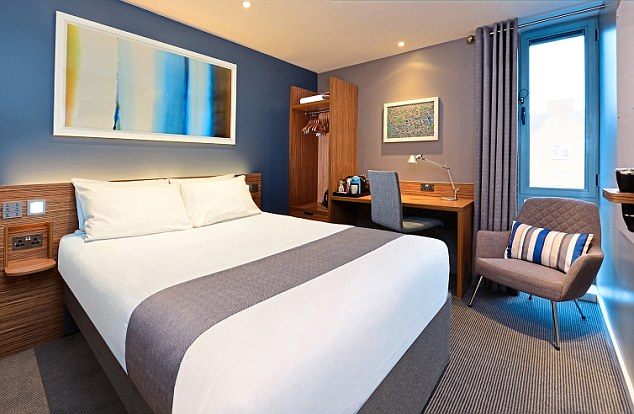In an era where travel is more accessible than ever, budget hotels have emerged as a cornerstone of the hospitality industry, offering a compelling blend of affordability, comfort, and strategic convenience. Gone are the days when “budget” equated to compromise on quality; today’s economy accommodations are cleverly designed to maximize value for money, making them an increasingly popular choice for a diverse range of travelers. This comprehensive article dives deep into the world of budget hotels, exploring their evolution, the value they offer, and how they’re redefining the landscape of affordable travel.
The Charm of Budget Hotel Experience

The modern budget hotel is a far cry from its predecessors. It’s no longer just a no-frills room but a thoughtfully designed space that prioritizes the essentials without skimping on what truly matters to today’s traveler. The transformation has been driven by a keen understanding of guest needs and a strategic focus on efficiency and core services.
A. Smart Design and Efficient Spaces
The hallmark of a contemporary budget hotel is its smart design. Every square foot is optimized for functionality and comfort. Rooms, while often compact, are ingeniously laid out to feel spacious and uncluttered. This often involves multi-functional furniture, built-in storage, and minimalist aesthetics. The goal is to provide a clean, comfortable, and efficient space for resting, working, or unwinding, without the unnecessary frills that drive up costs in luxury establishments. Think of it as intelligent living in a smaller footprint.
B. Streamlined Services and Amenities
Budget hotels focus on streamlined services that cater to the most common guest needs. This means you might not find a full-service spa or multiple fine-dining restaurants, but you will typically find high-speed Wi-Fi, comfortable beds, clean bathrooms, and often a complimentary breakfast or a grab-and-go food option. Many now offer self-check-in kiosks, reducing wait times and increasing efficiency. The focus is on quality over quantity, ensuring that the essential amenities are well-maintained and readily available.
C. Strategic Locations
One of the significant advantages of budget hotels is their strategic locations. They are often found near major transportation hubs, business districts, tourist attractions, or airport terminals. This allows travelers easy access to their destinations without incurring the premium prices associated with hotels directly in the heart of bustling city centers. Their positioning often means guests can save on transportation costs, further enhancing the overall affordability of their trip.
D. Technology Integration for Enhanced Efficiency
Technology plays a pivotal role in the operational efficiency of budget hotels. From mobile check-in apps and digital room keys to in-room smart TVs with streaming capabilities, technology integration streamlines processes and enhances the guest experience. This also allows for smaller staff sizes, contributing to cost savings that can be passed on to the customer. Many budget chains are early adopters of new hospitality tech, proving that innovation isn’t just for the high-end market.
E. Focus on Cleanliness and Basic Comforts
Above all, budget hotels prioritize cleanliness and basic comforts. Travelers expect a spotless room, fresh linens, and a reliable, hot shower. These fundamental elements are meticulously maintained, ensuring that even at a lower price point, guests can expect a hygienic and comfortable environment. This unwavering commitment to foundational quality builds trust and encourages repeat business.
The Evolution of the Budget Hotel Market
The landscape of budget hospitality has undergone a significant transformation, driven by changing consumer behaviors, technological advancements, and a growing recognition of the segment’s immense potential.
A. From “Motel” to “Smart Stay”
Historically, budget accommodations were often associated with roadside motels offering basic, sometimes questionable, facilities. Today, the term “budget hotel” encompasses a sophisticated array of brands, many of which are part of large, reputable hotel chains. This shift reflects a move from purely functional lodging to “smart stays” that combine efficiency with appealing design and targeted amenities. The perception has evolved from a last resort to a deliberate and intelligent choice.
B. The Rise of Branded Budget Chains
Major hotel groups like Accor (with Ibis, Novotel), Hilton (Hampton Inn, Tru by Hilton), Marriott (Fairfield Inn, Aloft), and IHG (Holiday Inn Express, Staybridge Suites) have heavily invested in and expanded their branded budget chains. This has brought consistency, reliability, and higher quality standards to the segment. Guests now know what to expect when they book with a recognized brand, fostering trust and repeat bookings. These brands leverage their vast networks for purchasing power and marketing reach, further solidifying their market position.
C. Appealing to Diverse Demographics
The customer base for budget hotels is incredibly diverse. It includes:
A. Business Travelers: Seeking cost-effective, efficient stays for short trips.
B. Leisure Travelers: Looking to save on accommodation to spend more on experiences or attractions.
C. Families: Needing affordable options for multiple rooms or longer stays.
D. Solo Backpackers: Prioritizing price and convenience.
E. Event Attendees: Attending conferences, concerts, or sporting events and needing proximate, economical lodging.
This broad appeal underscores the segment’s adaptability and universal value proposition.
D. Sustainability Initiatives in Budget Hospitality
Even in the budget sector, there’s a growing awareness of sustainability. Many budget hotel chains are implementing initiatives such as energy-efficient lighting, water-saving fixtures, waste reduction programs, and encouraging linen reuse. While perhaps not as extensive as in luxury properties, these efforts demonstrate a commitment to responsible tourism and resonate with an increasingly eco-conscious traveler base. This proves that affordability doesn’t have to come at the expense of environmental responsibility.
E. Data-Driven Operations and Revenue Management
Budget hotels are masters of data-driven operations and revenue management. They use sophisticated algorithms to dynamically price rooms based on demand, seasonality, and local events. This allows them to maximize occupancy rates and revenue while still offering competitive pricing. Operational data is also used to optimize staffing, inventory, and maintenance schedules, ensuring peak efficiency and cost control.
The Economic Benefits of Budget Hotels

The budget hotel segment is a significant economic driver, contributing to job creation, local economies, and overall tourism growth in ways often overlooked.
A. Boosting Tourism Accessibility
By offering more affordable accommodation options, budget hotels significantly increase tourism accessibility. They open up travel opportunities for a broader demographic, allowing more people to explore new destinations, attend events, and take vacations. This increased footfall directly benefits local businesses like restaurants, shops, and attractions.
B. Stimulating Local Employment
Budget hotels, despite their streamlined operations, still require staff for front desk services, housekeeping, maintenance, and potentially food and beverage. This creates numerous local employment opportunities, providing stable jobs and contributing to the local workforce’s income. The focus on efficiency means these roles are often highly optimized, contributing to productivity.
C. Attracting New Investment and Development
The proven profitability and scalability of budget hotel models attract new investment in property development and infrastructure. This can lead to the revitalization of urban areas, the development of new commercial zones, and improved public services around these hotel sites. It’s a clear signal of confidence in the local economy.
D. Supporting Event and Conference Tourism
Cities hosting large events, conferences, or festivals often rely heavily on budget hotels to accommodate attendees. These properties provide essential, affordable lodging that makes it feasible for a wider audience to participate, thereby supporting the local event industry and its associated economic benefits. They are a critical component of a healthy event tourism ecosystem.
E. Lower Entry Barriers for Entrepreneurs
Compared to developing luxury properties, budget hotels often have lower construction and operational costs, creating lower entry barriers for entrepreneurs and smaller investment groups. This fosters healthy competition and allows for more localized and niche budget accommodation options to emerge, catering to specific market needs.
How to Choose the Best Budget Hotel
Navigating the multitude of budget hotel options can be straightforward if you know what to look for. Consider these key factors to ensure a smart stay that meets your needs without breaking the bank.
A. Location and Accessibility
Prioritize a location that suits your itinerary. Is it close to public transport, your work destination, or the attractions you plan to visit? While budget hotels save you on room rates, a poorly chosen location can quickly negate those savings with high transportation costs or wasted time. Check maps and public transport links carefully.
B. Read Recent Reviews and Ratings
Online reviews and ratings from platforms like Google, TripAdvisor, or Booking.com are invaluable. Pay close attention to comments about cleanliness, staff helpfulness, noise levels, and Wi-Fi quality. Recent reviews are often the most accurate reflection of current conditions. Look for consistent positive feedback on essentials.
C. Check Essential Amenities
Verify that the hotel offers the essential amenities you need. Does it have free Wi-Fi? Is breakfast included? Is there parking if you’re driving? Does the room have a private bathroom? While budget means fewer frills, ensure the non-negotiables are covered to avoid hidden costs or inconveniences later.
D. Brand Reputation and Loyalty Programs
Opting for a well-known brand reputation within the budget segment can provide an added layer of assurance regarding quality and consistency. Many budget hotel chains also offer loyalty programs that can lead to discounts, free nights, or special perks, providing additional savings for frequent travelers.
E. Understand the Cancellation Policy
Before booking, always review the cancellation policy. Budget rates often come with stricter cancellation terms to maintain low prices. Ensure you understand the flexibility (or lack thereof) in case your plans change unexpectedly. Flexible options might cost slightly more but offer peace of mind.
The Future Outlook for Budget Hotels
The budget hotel segment is poised for continued growth and innovation, driven by evolving traveler expectations and technological advancements.
- Hyper-Personalization at Scale: Even budget hotels will leverage data to offer subtle but impactful personalization, such as remembering coffee preferences or suggesting local, affordable activities based on guest interests.
- Modular and Prefabricated Construction: Increased use of modular construction techniques will allow for faster, more cost-effective development of new budget properties, enabling quicker expansion into untapped markets.
- Enhanced Co-Working and Social Spaces: As more people combine work and leisure, budget hotels will invest further in well-designed co-working areas and inviting social lounges, catering to digital nomads and remote workers.
- AI-Driven Guest Services: AI chatbots and virtual assistants will become more sophisticated, handling routine guest inquiries, check-ins, and local recommendations, further streamlining operations and reducing the need for extensive human intervention.
- Gamification of Loyalty Programs: Expect more engaging and interactive loyalty programs, possibly incorporating gamification elements to reward frequent stays and encourage direct bookings.
Conclusion
Budget hotels are no longer just an alternative; they are a primary choice for millions of travelers worldwide. By mastering efficiency, embracing smart design, and focusing on the core needs of their guests, they continue to prove that comfort, convenience, and quality don’t have to come with a hefty price tag. As the travel landscape continues to evolve, budget hotels will undoubtedly remain a vital and dynamic force, offering smart stays and big savings for all.









